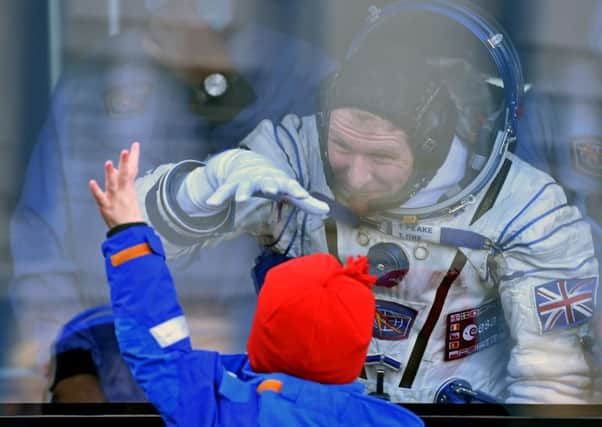Dani Garavelli: Tim Peake keeps space dream alive


Created by a national newspaper, it is a treasure trove of space memorabilia: there’s a cut-out-and-keep rocket, a map of the flight path, a guide to the astronauts’ clothing, photographs of the moon and an A-Z of jargon – A is for ablation, the loss of heat by vapours or melting; Z is for zero gravity.
There is a detailed timeline of the mission and a 7-inch record containing audio of Neil Armstrong’s famous message. The folder belongs to my husband – a gift from far-sighted parents – but, every so often, I like to pore over its contents and imagine what it would have been like to have read it contemporaneously when the frontiers of space were opening up and the possibilities seemed limitless.
Advertisement
Hide AdAdvertisement
Hide AdMy husband and I are too young to remember Apollo 11 ourselves, although I’m told I watched it from my high chair as the adults around me squealed with delight. Like most people of our generation, however, we grew up with a sense of wonderment and expectation. We were convinced that, by the time we had children of our own, astronauts would have planted their flag on Mars and ordinary people would be going on package holidays to the Moon.
So, none of that happened. The US and Russia, who had been using the space race as a proxy war, grew tired of Moon missions and refocused their energies on developing reusable hardware in the form of the now-defunct space shuttle programme and on robotic spacecraft (such as Philae, which landed on a comet). Robots can travel more cheaply than people and without the attendant risks.
Despite this, the general public retained its fascination with manned missions. You can sense this in films such as Gravity, which pitted Dr Ryan Stone (Sandra Bullock) against infinity, or The Martian, which saw Mark Watney (Matt Damon) survive in an alien environment. When the Soyuz rocket blasted off from Kazakhstan last week with Major Tim Peake on board there was near-universal excitement tinged with nostalgia for the days when space exploration was a priority and being an astronaut was as cool as it got. There was a retro, almost cinematic feel to it: Peake’s touching farewell to his four-year-old son who cried and said “I want to go with Daddy” and the congratulatory messages from the Queen and Elton John, which Peake answered from space. It was as if – after decades of listening to Space Oddity – we were finally getting to experience it for ourselves (albeit, I trust, with a more positive ending).
Our excitement has been reflected by Peake, who is in his element. Being in space isn’t just satisfactory, it is “spectacular”. An affable bloke, he is happy to satisfy our curiosity about his sleeping arrangements – he drifts around in his sleeping bag – and his food: he has already enjoyed a bacon sarnie. Best of all, he has described the view: “We always talk about seeing Planet Earth and how beautiful it is. But what people don’t mention that much is when you look in the opposite direction, you see how dark space is. It is just the blackest black.”
The churlish and unimaginative have suggested all this frenzy about Peake is a bit, well, parochial. He is being touted as the first Briton in space (wrongly – Helen Sharman got there first), but the International Space Station (ISS) has been occupied for 15 years and the Mir space station was occupied for nine years before that. We have long been able to look up at and imagine human beings floating 250 miles above our heads; they just didn’t hail from the UK.
Columnist Simon Jenkins went so far as to dismiss the six-month Principia mission as a “vanity project” , criticising the £16 million that the UK government gave to the space station and referring to the playing of the “jingo card”. But that’s not right: jingoism is what’s driving the bombing of Syria. The rallying behind Peake is born of a weariness with war and austerity and a desire to look beyond ourselves. Thinking about the ISS has given us respite from thinking about Isis.
Travelling to the space station is not scientifically worthless either. While he is there, Peake will be carrying out experiments, many of which are aimed at working out whether longer manned missions to, say, Mars might eventually be possible. His blood pressure, cartilage and immune system will be tested in an attempt to assess the impact of time spent in space. Other experiments include growing protein crystals and blood vessel cells in weightless conditions.
It is hoped Peake’s time in the ISS will also help encourage more young people to study science, technology, maths and engineering. Huge efforts have been made to involve children; on his return, hundreds of schools will be asked to cultivate batches of seeds taken on the mission alongside batches which stayed at home to work out how time spent in space affects germination.
Advertisement
Hide AdAdvertisement
Hide AdHow anyone could not be excited by Peake’s extra-terrestrial adventure is beyond me. Yes, money is tight, but £16m is not a huge amount and look how much we stand to reap in increased knowledge and aspirations. The impetus to explore, to expand our horizons, represents much of what’s best in human nature. We spend so much time mired in earthly misery – let’s not surrender our capacity to dream or our willingness to head out into the unknown. «